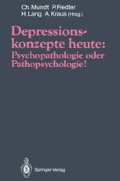Zusammenfassung
Der nachfolgende Beitrag umreißt zunächst den Gegenstandsbereich attributionstheoretischer und attributionaler Überlegungen sowie das Depressionsmodell der “Gelernte Hilflosigkeit” und seiner “attributionalen Reformulierungen”. Daran schließen sich ein Überblick über die empirische Befundlage, Kritik sowie weiterführende Ordnungsgesichtspunkte an (Modelltypen nach Brewin, 1985; Hoffnungslosigkeitsmodell). Ein Hinweis auf weitere attributionsbezogene Zugangsmöglichkeiten (Beachtung differentieller Attributionshäufigkeiten und attributionaler Komplexität, Verbindung von Makro- mit Mikroanalysen) wird gegeben. In sechs abschließenden Thesen wird der Beitrag attributionsbezogener Überlegungen zur Aufklärung der Ätiologie und des Verlaufs depressiver Störungen zusammenfassend gewürdigt.
Access this chapter
Tax calculation will be finalised at checkout
Purchases are for personal use only
Preview
Unable to display preview. Download preview PDF.
Literatur
Abramson LY, Metalsky GI, Alloy LB (1989) Hopelessness depression: a theory-based subtype of depression. Psychological Review 96: 358–372
Abramson LY, Seligman MEP, Teasdale JD (1978) Learned helplessness in humans: Critique and reformulation. Journal of Abnormal Psychology 87: 49–74
Alloy LB, Abramson LY, Metalsky GI, Hartlage S (1988) The hopelessness theory of depression: Attributional aspects. British Journal of Clinical Psychology 27: 5–21
Barnett PA, Gotlib IH (1988) Psychosocial functioning and depression: distinguishing among antecedents, concomitants, and consequences. Psychological Bulletin 104: 97–126
Beck AT (1967) Depression: Clinical, experimental, and theoretical aspects. Harper & Row, New York
Brewin CR (1985) Depression and causal attributions: What is their relation? Psychological Bulletin 98: 297–309
Brewin CR (1988) Cognitive foundations of clinical psychology. Lawrence Erlbaum, Hillsdale NJ
Carver CS (1989) How should multifaceted personality constructs be tested? Issues illustrated by self-monitoring, attributional style, and hardiness. Journal of Personality and Social Psychology 56: 577–585
Fletcher GJ, Danilovics P, Fernandez G, Peterson D, Reeder GD (1986) Attributional complexity: an individual differences measure. Journal of Personality and Social Psychology 56: 757–764
Flett GL, Hewitt PL (in press) Clinical depression and attributional complexity. British Journal of Clinical Psychology
Flett GL, Pliner P, Blankstein KR (1989) Depression and components of attributional complexity. Journal of Personality and Social Psychology 56: 757–764
Follette VM, Jacobson NS (1987) Importance of attributions as a predictor of how people cope with failure. Journal of Personality and Social Psychology 52: 1205–1211
Heider F (1958) The psychology of interpersonal relations. Wiley, New York (deutsch 1977: Psychologie der interpersonellen Beziehungen). Psychological Review 51: 358–374
Kammer D (1982) Depression, Attribution und Erwartungsgeneralisierung. Unveröffentlichte Dissertation, Universität Bielefeld
Kammer D (1983) Depression, attributional style, and failure generalization. Cognitive Therapy and Research 7: 413–424
Kammer D (1984a) Attributional processing style differences in depressed and nondepressed individuals. Motivation and Emotion 8: 211–220
Kammer D (1984b) Die Kausaldimension Generalität: Vorauslaufende Bedingungen für das Zustandekommen globaler und spezifischer Attributionen. Zeitschrift für Experimentelle und Angewandte Psychologie 31: 48–52
Kammer D, Hautzinger M (Hrsg.) (1988) Kognitive Depressionsforschung. Huber, Bern
Kammer D, Stiensmeier-Pelster J (1986) Depressive Attribuierung: Eine Standortbestimmung. In M Amelang (Hrsg) Bericht über den 35. Kongreß der Deutschen Gesellschaft für Psychologie in Heidelberg 1986 (Band 2,). Hogrefe, Göttingen, S 557–566
Kammer D, Stiensmeier-Pelster J (1988) Erfassung des depressiven Attributionsstils: Erfahrungen mit einer deutschen Form des ASQ. In G Krampen (Hrsg) Diagnostik von Kontrollüberzeugungen. Hogrefe, Göttingen
Kelley HH (1973) The processes of causal attribution. American Psychologist 28: 107–128
Lunt P (1988) The perceived causal structure of examination failure. British Journal of Social Psychology 27: 171–180
Miller IW, Norman WH (1979) Learned helplessness in humans: A review and attribution theory model. Psychological Bulletin 86: 93–118
Mikulincer M (1986) Attributional processes in the learned helplessness paradigm: behavioral effects of global attributions. Journal of Personality and Social Psychology 51: 1248–1256
Peterson C, Seligman MEP (1984) Causal explanations as a risk factor for depression: Theory and evidence. Psychological Review 91: 347–374
Peterson C, Semmel A, Baeyer Cv, Abramson LY, Metalsky GI, Seligman MEP (1982) The attributional style questionnaire. Cognitive Therapy and Research 6: 287–300
Richter K (1989) Der depressive Attributions- und Bewertungsstil. Eine Untersuchung an depressiven psychiatrischen Patienten, nicht-depressiven psychiatrischen Patienten und nichtpsychiatrischen chirurgischen Patienten. Unveröffentlichte Diplomarbeit, Universität Bielefeld
Robins CJ (1988) Attributions and depression: why is the literature so inconsistent? Journal of Personality and Social Psychology 54: 880–889
Russell D (1982) The causal dimension scale: a measure of how individuals perceive causes. Journal of Personality and Social Psychology 42: 1137–1145
Russell D, McAuley E (1986) Causal attributions, causal dimensions, and affective reactions to success and failure. Journal of Personality and Social Psychology 50: 1174–1185
Schettgen P, Frech U, Seeba H, Wirz M (1988) Cave: Psychometrische Qualität eines inhaltsanalytischen Verfahrens zur Messung von Attributionsstilen. In O Neuberger (Hrsg) Augsburger Beiträge zu Organisationspsychologie und Personalwesen, Heft 1.
Seligman MEP (1981) A learned helplessness point of view. In LP Rehm (Ed) Behavior therapy for depression. Present status and future directions. Academic Press, New York
Seligman MEP (1983) Erlernte Hilflosigkeit (2 veränd Aufl). Urban & Schwarzenberg, München (Original 1975: Helplessness. On depression, development, and death).
Seligman MEP, Castellon C, Cacciola J, Schulman P, Luborsky L, Ollove M, Downing R (1988) Explanatory style change during cognitive therapy for unipolar depression. Journal of Abnormal Psychology 97: 13–18
Sweeney PD, Anderson K, Bailey S (1986) Attributional style in depression: A meta-analytic review. Journal of Personality and Social Psychology 50: 974–991
Weiner B (Ed) (1974) Achievement motivation and attribution theory. General Learning Press, Morristown NJ
Weiner B (1980) Human motivation. Holt, Rinehart & Winston, New York
Weiner B (1986) An attributional theory of motivation and emotion. Springer, New York
Wittchen H-U, Saß H, Zaudig M, Koehler K (Hrsg) (1989) Diagnostisches und Statistisches Manual Psychischer Störungen DSM-III-R. Beltz, Weinheim und Basel
Zullow HM, Oettingen G, Peterson C, Seligman MEP (1988) Pessimistic explanatory style in the historical record. American Psychologist 43: 673–682
Editor information
Editors and Affiliations
Rights and permissions
Copyright information
© 1991 Springer-Verlag Berlin Heidelberg
About this paper
Cite this paper
Kammer, D. (1991). Attributionsbezogene Zugänge zur Depression. In: Mundt, C., Fiedler, P., Lang, H., Kraus, A. (eds) Depressionskonzepte heute: Psychopathologie oder Pathopsychologie?. Springer, Berlin, Heidelberg. https://doi.org/10.1007/978-3-642-76318-2_15
Download citation
DOI: https://doi.org/10.1007/978-3-642-76318-2_15
Publisher Name: Springer, Berlin, Heidelberg
Print ISBN: 978-3-642-76319-9
Online ISBN: 978-3-642-76318-2
eBook Packages: Springer Book Archive

